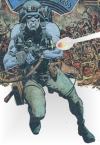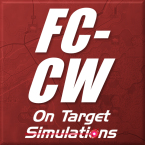Why would one NOT pick the most interesting period, when looking at the balance of forces, when deciding to pick a period to wargame?????
The "pick a period" part is what I'm referring to. It can feel artificial, because in this case the war never happened. This is one of the few, at the moment only, popular conflict in wargames where a convenient moment to start the war is picked. Wars start at inconvenient times for at least some of the combatants most of the time. In this case the war starts at a convenient time for NATO, when it has found a way to deal with the Soviet advantage in quantity.
Let's say the war had turned hot in the 1960's, somewhere there would've been a stalemate and peace, and after that the development of military technology and the balance in Europe would develop in a similar way to what really happened, so we end up with roughly the same situation in the 1980's, but there's no war. How many 1980's wargames do you think there would be? I would say there would be few, because most would focus on the actual war.
In other words: this particular time for the Cold War to turn hot could be picked because the war didn't happen, as otherwise the moment where it would've started would've been more popular to wargame.
From a wargaming perspective, it is indeed a good and perfectly understandable decision to create a wargame for the most interesting period. From the perspective of historical accuracy, there are some issues with that approach that wargames based on actual wars don't suffer from.








